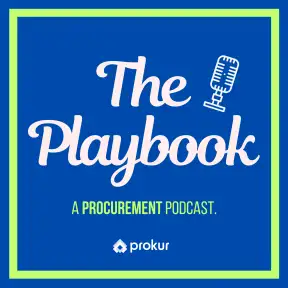Turning RFx Rejections Into Opportunities
Welcome to the Playbook. I'm your host, Emily Rose. Today, we're diving into a topic that every business encounters at some point, r f x rejections. Although receiving a rejection letter can be disheartening, there are invaluable lessons to be learned from these experiences. Stay tuned as we explore how to turn these rejections into opportunities for growth.
Amelie Rose:Rejections are a natural part of the RFX process and can stem from various factors such as pricing, misunderstandings, or simply a better fit with another vendor. It's crucial to understand that these rejections are not necessarily a reflection of your company's value or capabilities. Instead, they should be viewed as learning opportunities. Embrace the chance to evaluate what went wrong, understand the client's perspective, and use this understanding to hone your proposals. Each rejection can provide valuable insights that help refine your approach, making your future submissions even stronger.
Amelie Rose:One of the first steps after receiving a rejection is to seek constructive feedback. Reach out to the client and ask for detailed observations on your proposal. This is not just a formality. It's an essential part of understanding their perspective. Ask specific questions to uncover what aspects of your proposal were lacking and where improvements are needed.
Amelie Rose:Was it the pricing? Was it a misunderstanding of the requirements? Or perhaps something else entirely? This feedback is crucial for identifying weak spots in your submissions. By knowing exactly where you fell short, you can take targeted actions to address those issues in future proposals, so don't shy away from this step.
Amelie Rose:Embrace it as a valuable learning opportunity. With the feedback in hand, the next step is conducting a thorough internal review of your proposal process. Begin by comparing your rejected proposals with your successful ones to identify any recurring issues or patterns. This will help you pinpoint specific areas that need improvement. You might need to reassess how you interpret RFX to ensure you fully understand the client's requirements.
Amelie Rose:Additionally, evaluate the clarity and persuasiveness of your proposal writing. Are there sections that consistently fall short? By addressing these areas systematically, you can refine your process and produce stronger, more competitive proposals in the future. Improving the proposal process is crucial for turning RFX rejections into future wins. Use the insights you've gained from feedback to refine this process.
Amelie Rose:Consider organizing training sessions on effective proposal writing, ensuring your team's skills are sharpened and up to date. Revising and updating your proposal templates can also make a huge difference, streamlining the process and making it more efficient. Additionally, investing in proposal management tools can help better organize and manage your submissions. A well systematized process not only prevents past mistakes but also enables you to craft compelling and competitive proposals moving forward. When it comes to proposals, communication is absolutely key.
Amelie Rose:It's not just about having the right information, but about conveying it in the most effective way possible. One vital step is to enhance your team's skills in both persuasive writing and presentation. By investing in training sessions or workshops focused on these areas, you can significantly elevate the quality of your proposals. Strong communication can make the difference between a good proposal and a great one, thereby increasing your chances of success. Building relationships with potential clients helps you understand their needs and preferences.
Amelie Rose:Engage with clients well before an RFx is issued to gain a deeper insight into their challenges and expectations. By fostering these relationships, you can tailor your proposals more effectively, ensuring they address specific client needs and stand out from the competition. Knowing the client well can give you a significant edge in the competitive world of procurement as it allows you to craft responses that not only meet but exceed their requirements. In today's fast paced digital age, leveraging technology is crucial for staying ahead in the competitive landscape of RFx processes. One effective way to do this is by incorporating proposal management software.
Amelie Rose:This technology streamlines the way you track, write, and manage your proposals. By using such software, you ensure that your submissions are not only well organized and timely, but also precisely tailored to each client's specific needs. This level of meticulous attention and efficiency can provide a significant competitive edge, setting your proposals apart from the rest and increasing your chances of success. Staying updated on industry trends is crucial for anticipating what your clients might look for in an RFx response. By understanding and adapting to the latest trends, you can ensure that your proposals are not only current but also more appealing and relevant to the client's needs.
Amelie Rose:This proactive approach can significantly enhance the effectiveness of your submissions. Establishing a feedback loop is crucial for ongoing improvement. Create a systematic approach to incorporate feedback, ensuring that this becomes an integral part of your proposal process. Regularly update your strategy based on insights from both successful and unsuccessful proposals. This continuous evolution will help refine your approach and increase your chances of success in future responses.
Amelie Rose:Rejections are inevitable in the RFx process, but how your team handles them can make a significant difference. Developing resilience is crucial to navigating these setbacks constructively. Consider implementing training that focuses on maintaining morale and drive even when faced with rejection. This training can foster a mindset geared towards continuous improvement, helping your team stay motivated and laser focused on refining their approach. By building resilience, you'll ensure that each member of your team views setbacks not as roadblocks, but as opportunities to grow and excel.
Amelie Rose:After receiving a rejection, it's vital to maintain a professional relationship with the client. Reach out to express your appreciation for the opportunity to participate in the RFx process. Show your willingness to remain in contact for future opportunities. This can open doors for networking, allowing you to turn a current rejection into a potential future collaboration. By staying connected and engaged, you keep yourself on the client's radar for when new prospects arise.
Amelie Rose:RFX rejections are detours towards improvement. Embrace rejection as an integral learning process to refine approaches and build resilience. Each rejection is a stepping stone to future success. Thank you for listening to the playbook. Until next time, this is Emily Rose.

